Harlan Ellison 1934-2018: Essential and Impossible
Did you feel that? That sudden drop in pressure, that slump, as if the world itself had let out a long-held breath? I’m sure it was registered on every spot on earth, from Cleveland to Calcutta, from Reykjavik to Tierra del Fuego. That was Harlan Ellison leaving the building. No man was ever less likely to die peacefully in his sleep at the ripe old age of eighty four, but that’s exactly what happened on the morning of June 28th, and the effect is tantamount to global nuclear disarmament. The immanent threat is over; finally, we can all relax a bit.
An authoritative assessment of Ellison’s tumultuous sixty year career can now begin and is far beyond the scope of this piece, even if I had the ability to do it — which I don’t. All that I can say is that the world has instantly become a less interesting, less vital place than it was when the human bomb that was Harlan Ellison was still ticking away. He was one of those rare people who can actually alter the atmosphere; in his presence, the air was sharper, the light brighter, the temperature higher, and everything seems a little dulled and diminished now that he’s gone.
The couple of times that I met him in person — in the mid 70’s, at the legendary Change of Hobbit bookstore in Los Angeles — the intensity and excitement radiated from him in waves. It was actually a bit frightening, like being too close to an enormous bonfire. It was immediately evident that this was a dangerous person; he would break boundaries in ways good and bad, because that was life to him, and he didn’t know any other way to exist. It’s amazing that he lived to be eighty four — by all rights he should have succumbed to stroke or homicide long ago.
[Click the images for bigger versions.]
He was the least shy writer of his era (of any era), and his virtues and defects as a writer and as a man were on full public display for the better part of six decades. His fearlessness, passion, and commitment to justice could set his pages aflame with power and brilliance… or they could lurch out of control. When that happened, the result was writing that came across as excessively mannered or self-indulgent, though we forgave him for it, because we knew that he poured himself into his writing without reservation and made every line as good as he possibly could. To an unusual degree, the man was the work and the work was the man; it’s no surprise that they would sometimes share the same faults.
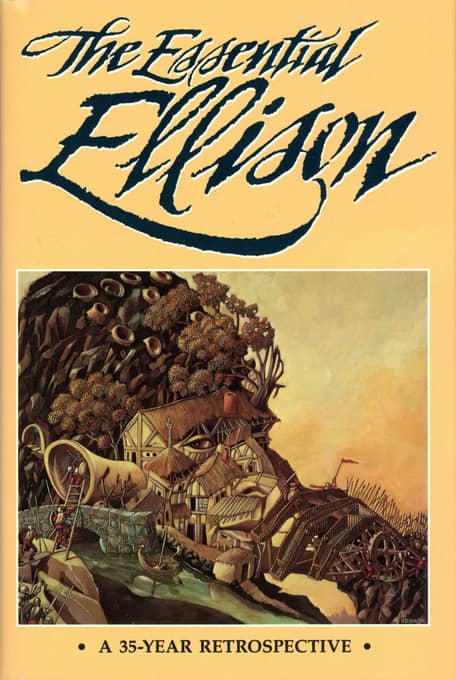 |
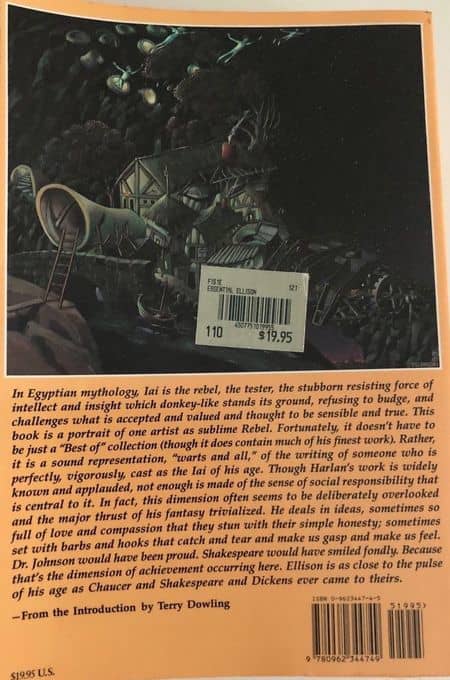 |
The combativeness and pugnacity that led him to aggressively and unceasingly fight for his rights (and the rights of all authors) sometimes veered close to outright paranoia and too often led him to indulge in verbal — and even physical — assaults on those he took umbrage at. He was one of the most litigious people alive, and though he was certainly right in believing that Hollywood has always felt too free to lift whatever it likes from writers (especially writers in despised “popular” genres), surely not everyone Ellison dragged into court was guilty of the intellectual theft he was too quick to accuse them of.
His relentless and daring boundary-breaking gave us both classic stories that shattered long outdated restrictions on what science fiction writers could do with their medium…and embarrassing, inexcusable incidents when the boundaries that he ran roughshod over were ones that should be most respected, as in his infamous encounter with Connie Willis at the 2006 Hugo Awards, when he groped her breast and then tried to pass it off as a joke. No one laughed.
As time passes, the controversies and outrages sparked by his larger than life but often out of control personality will inevitably fade, though the worst will justly not be forgotten; those who loved him and those who hated him will alike pass away, and the kindnesses he bestowed and the injuries he inflicted will come to be less meaningful than his work, which will endure.
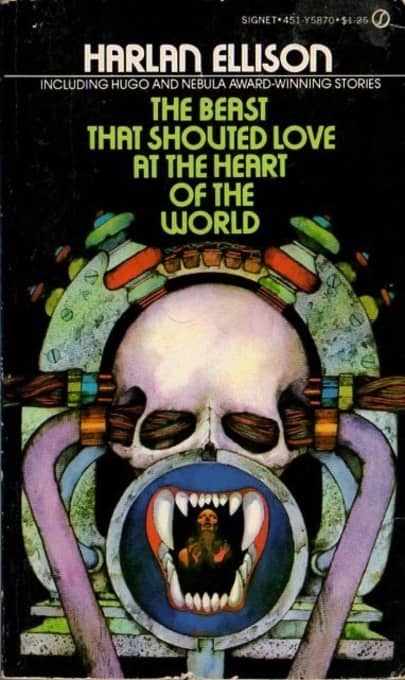 |
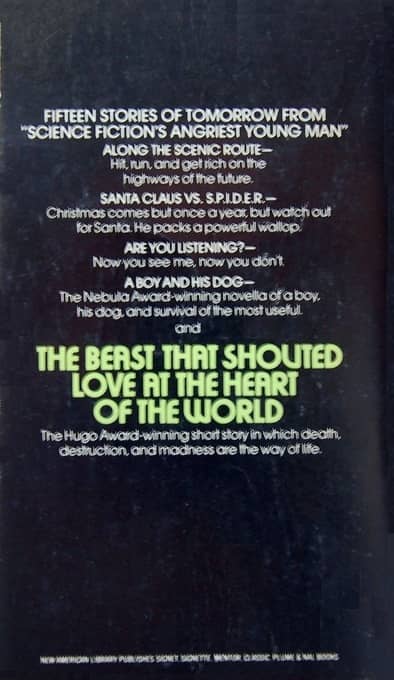 |
As a science fiction writer (a term he rejected but was unable to escape, and he dealt in fantasy as much as SF) he was a nonpareil, and his finest stories will remain as vigorous and exhilarating as they were to the first readers who encountered them as much as fifty or sixty years ago. Stories like “Pretty Maggie Moneyeyes” and “A Boy and His Dog” and “The Beast that Shouted Love at the Heart of the World” can still knock the breath right out of you.
Reading Harlan Ellison at his frequent best is like stepping out of the shower and grabbing hold of a live wire, and when you’ve finished turning the pages, you haven’t just passed the time; you’ve had a challenging, changing experience.
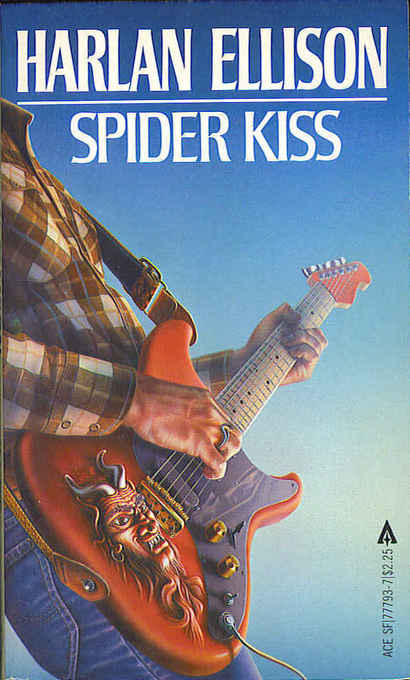 |
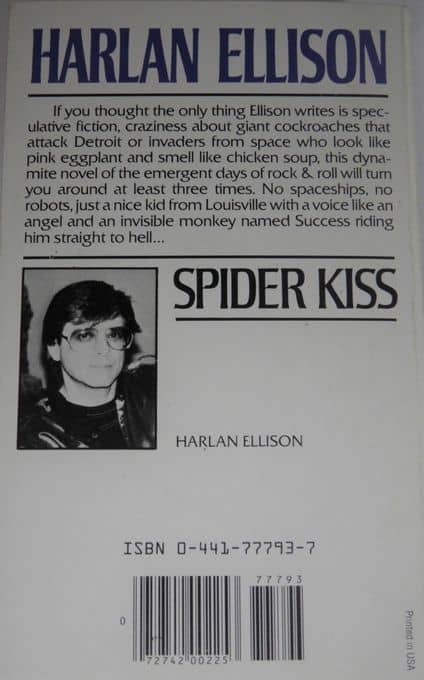 |
He was preeminently a short story writer who wrote only a few genuine novels, likely because the blazing intensity that was his stock in trade was difficult to sustain at extended lengths. One exception is his outstanding 1961 novel Spider Kiss, which chronicles the rise and fall of a rock and roll singer whose excessive, almost demonic talent is matched only by his viciousness and lack of moral scruple.
Five years later Ellison wrote the script for The Oscar, a film which took his novel’s basic situation and transferred it to Hollywood, substituting actor Frank Fane for the book’s singer, Stag Preston. The Oscar was a sore spot for the rest of Ellison’s life. The acting is almost uniformly awful, which is not Ellison’s fault — he didn’t cast the movie, and the film is unique in my experience in that every single line is a howler… which is Ellison’s fault. I often thought that if I ever met him again, I would tell Ellison that few movies have ever given me as much joy as The Oscar. It’s probably a good thing I never got the chance; though I would have meant my praise sincerely, he likely would have broken my nose.
Though The Oscar was his only screenplay for a major film, he was for many years sporadically active in television, writing scripts for, among other shows, Star Trek, The (New) Twilight Zone, The Outer Limits, and The Man from U.N.C.L.E. He was frequently less than happy with the finished product, sometimes demanding that he be credited as “Cordwainer Bird” when he felt that his script had been completely ruined (as on Voyage to the Bottom of the Sea and The Flying Nun). He complained for years that his script for “City on the Edge of Forever,” perhaps the best-loved of all Star Trek episodes, had been grossly mutilated, though he did accept non-Cordwainer credit for the show.
It is perhaps surprising to realize that despite the well-deserved reputation of his television work, in a period of over forty years he wrote only twenty one scripts. Surely his prickliness and steadfast refusal to compromise on any damn thing — even when working in a collaborative medium like television — kept this part of his career from being more extensive, and we can only lament the great things we never got, and wonder what his Star Trek: the Next Generation or X-Files or Battlestar Galactica scripts would have been like. We’ll just have to accept the bad with the good and be grateful for the excellent shows he did write.
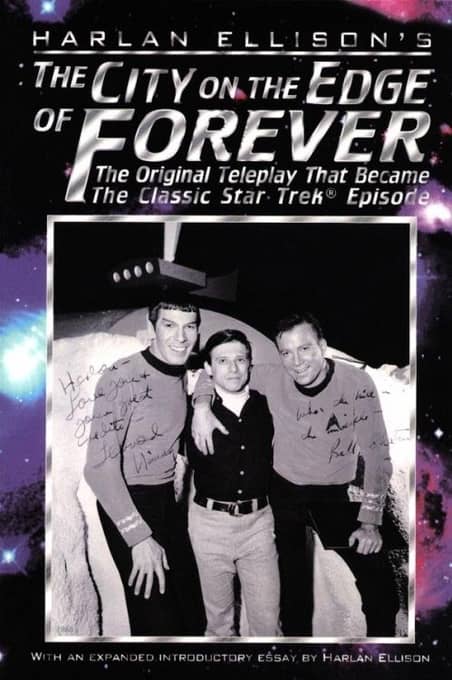 |
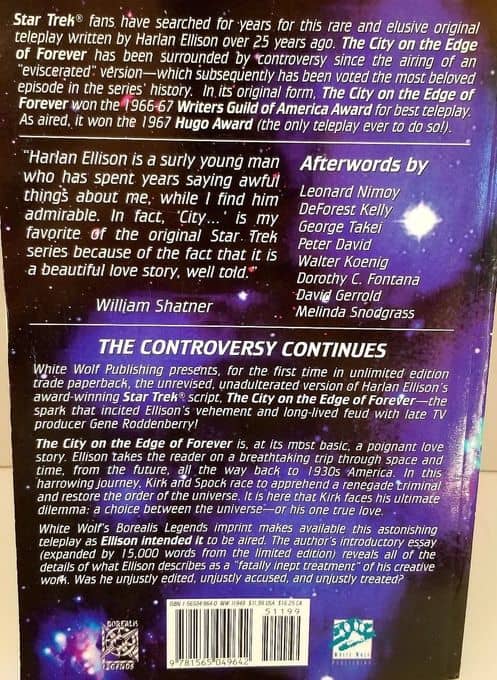 |
In his case especially, taking bad and good together is unavoidable, because Harlan Ellison was, from start to finish, both essential and impossible, incomparable and inexcusable. Of course a hard-to-balance, difficult-to-reconcile combination like that isn’t what we want from people; we like things to be cut and dried, black or white, here or there. Contradictions like Harlan Ellison’s make us uncomfortable, which means that he accomplished his mission. Comfort was not his goal, and the last thing he wanted was for anyone to be secure in where they stood, with him or with anything else. To settle was to die, and no one was ever more alive than Harlan Ellison. It’s our good fortune that he used his unsettling gifts and his thorny, often infuriating personality to prod us all, to keep us thinking, keep us moving, keep us fighting, keep us living.
Immediately upon hearing of his death, I naturally thought of the many stories of his that have meant so much to me, stories that I first encountered forty five years ago, when I was way too young to be reading them. I suppose my favorite is “A Boy and His Dog,” but tonight I can’t stop thinking about “Delusion for a Dragon Slayer,” which appeared in Ellison’s 1967 collection I Have No Mouth and I Must Scream.
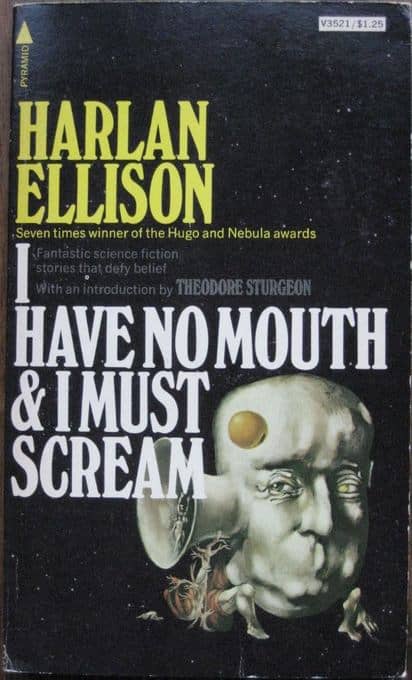 |
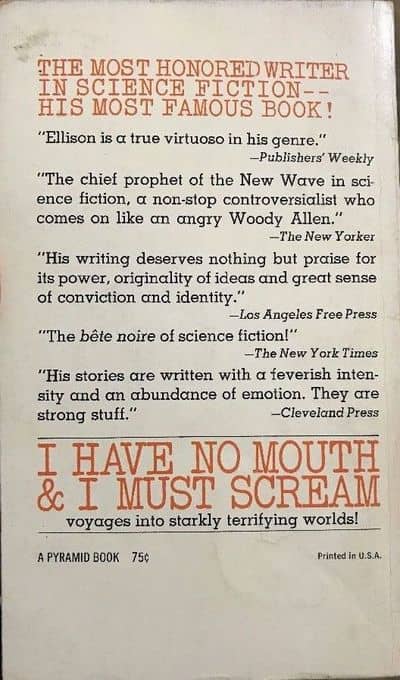 |
“Delusion for a Dragon Slayer” is the story of harried, harassed everyman Warren Glazer Griffin, who one day is seemingly killed in a construction accident, only to find that he has been swept out of his deadening, colorless life into a heightened, hallucinogenic fantasy world of sword and sorcery adventure, a world in which all of his encounters are moral tests… tests which he invariably fails. The ship Griffin captains and the crew which trusts and adores him are lost because of his egotism and carelessness. He stabs the monster guarding the maiden fair from behind, winning the lady not with courage but with treachery. And unwilling to wait for the woman to learn to love him and unable to restrain his own lust, he resorts to force and rapes her. Staggering away from his weeping “bride,” a desolate Griffin realizes what he has done, realizes what he is. And then the verdict, harsh but just:
Griffin looked up and had but a moment to realize he had not succeeded in winning his heaven… as the seventy-eight-foot creature he could have called nothing less than a dragon opened its mouth that was all the world and judgment, and ground him to senseless pulp between rows of triple-fanged teeth.
Back in the “real” world (but just as the world of his dream, a place of moral tests to be passed or failed), the workers dig Griffin’s body out of the rubble and are struck by the extraordinary expression on the dead man’s face. They have some difficulty deciding just what the expression signifies:
They might have settled on a pathetic sense of loss, had their sensibilities run that deep, but none of them would have felt that the expression said, with great finality: a man may truly live in his dreams, his noblest dreams, but only, only if he is worthy of those dreams.
Ellison concludes the story of the tragic failure of Warren Glazer Griffin to be the man he wanted to be with a beautiful, mysterious line that has haunted me for over forty years: “It did not rain that night, anywhere in the known universe.”
What does this line mean? I’m not sure, exactly. Is it one more judgment against Griffin, an ultimate withholding of sympathy? Or is it a manifestation of mourning, of a grief too deep for tears, a sharing in his infinite, inexpressible loss? Or does it simply say that the life of a man matters, and that even if he fails, the very fact that he has aspired to something that he couldn’t ultimately reach must make the universe itself pause and take notice?
I don’t know. But I know this — on the night of June 28th, 2018, it rained in plenty of places in the known universe.
But it shouldn’t have.
Thomas Parker is a native Southern Californian and a lifelong science fiction, fantasy, and mystery fan. When not corrupting the next generation as a fourth grade teacher, he collects Roger Corman movies, Silver Age comic books, Ace doubles, and despairing looks from his wife. His last article for us was Burton in a Skirt, or What Are You Going to Do with Your Life when Game of Thrones Is Over?
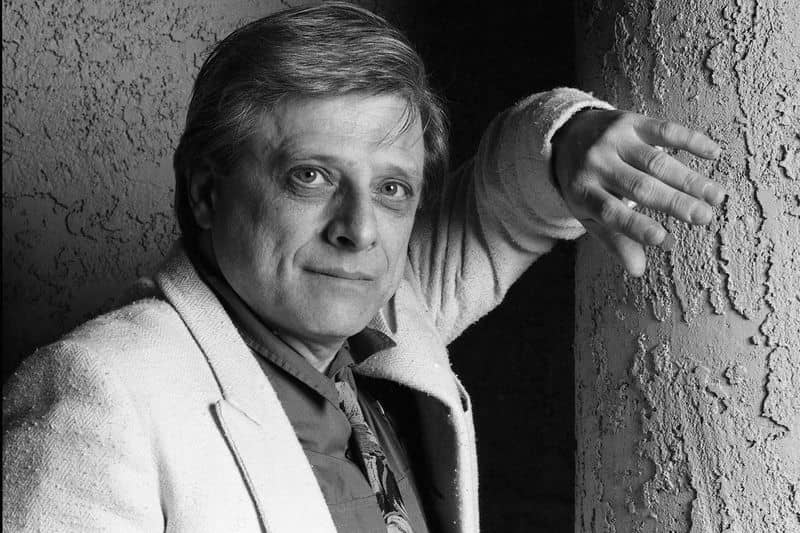
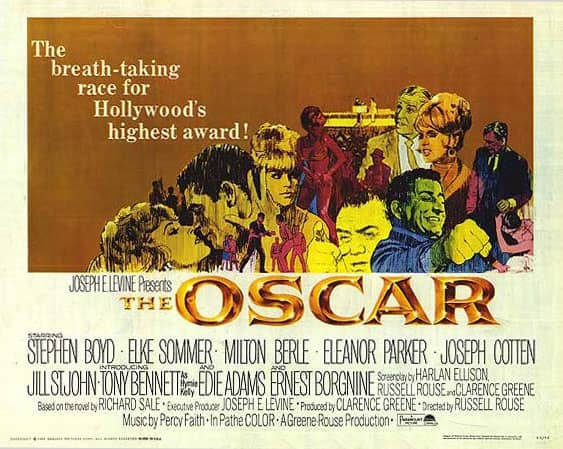
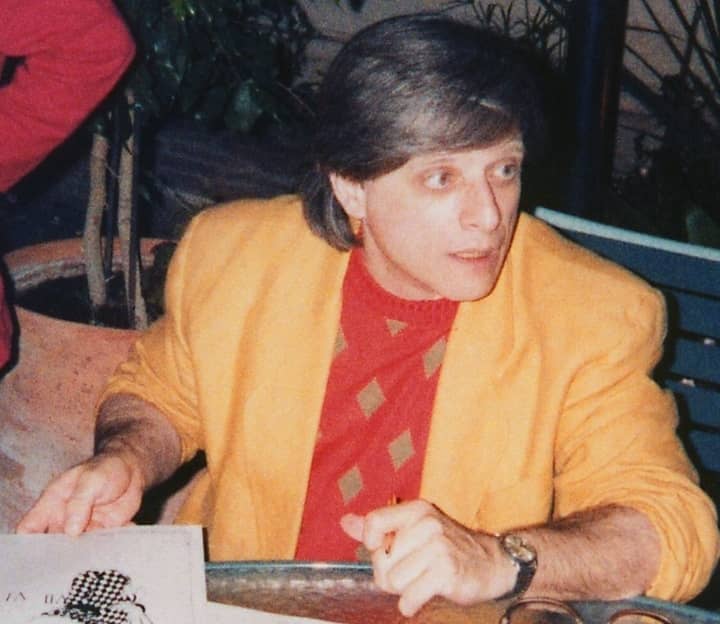
Wow. I was hoping, when a piece on Harlan showed up here, that it would do him justice — and by God, this one does. An excellent piece of writing, Mr. Parker, and well worthy of being here. I got to see Harlan Ellison live at Torcon II in 1973 and Discon II in 1974, and heard him read “When Hitler Painted Roses” and “Adrift off the Islets of Langerhans…” His readings, as anyone knows who’s heard them live, were electrifying and hypnotic. At a smaller con at Kent State in 1977, a group of us were allowed to sit in on an assessment of original stories, that had been submitted for critiquing, by writers hoping to get some feedback for improvements and changes. Ellison praised one particular story so much (I believe, if I recall correctly, he even said he’d purchase it for publication, somewhere) that the young man who’d authored it broke into sobs. All the rest of us were jealously stunned. Losing Ursula Le Guin earlier this year almost knocked me senseless; losing Harlan Ellison — well, I can’t even process it. His work has been a significant part of my life since 1966. For some of us, that rain you mentioned won’t be stopping anytime soon.
R.I.P. mr Ellison!
I’ve loved and read his work for years since “Repent, Harlequen! said the Tick-Tock-Man” was read in school. No, the teacher didn’t get fired for it, amazingly…
Mostly I read bunches of his short stories. Now, I’m just going to add some that stick out in my head, this article is magnificent…
First, during Epic Illustrated there were some Harlan Ellison stories adapted for the magazine non-code comics format. C-Chute is more well known, but I love “Run for the Stars” far better.
Later Dark Horse adapted some – Phil Foglio boosted with his comic style one of them, but the more generic comic art was used for “Quicktime” – IMO that was Harlan Ellison’s tribute/his own version of Arthur Clarke’s Exile of the Aeons.
He also wrote for the underground. Not just those under the counter paperbacks, but underground comics.
Larry Todd adapted in one volume his “Chocolate Alphabet” which is brilliant. I reccomend a quick Ebay for a reading trip before Comic Book guy puts it up to the $200 it was during the comic book boom, even for non collectable editions.
Another contibution is his “Glass Teat” series where he did a regular column for the East Villiage other. A lot of articles pointing out the corrosive and increasingly propagandized/bought out influence of media. This is usually cheap fodder at the used bookstore/Amazon – buy ’em quick before the scalpers grab them.
Sadly, his image was tarnished with the Xers, Millenials whatever due to his old school ‘conservative’ (he’d sock me for saying that I’d bet) attitudes and habit of suing people who posted his works online. I defended him a lot, saying “Just go to the used bookstore if you want a pile of his work cheaply” and got banned a bunch, even a few attempts to break into my accounts/websites…
I’d often wished I could meet him someday, but after more of my work is published and selling so I’m not just a drooling fanboy to him. 50/50 he might be nice and cool, other half either sock me and threaten to sue me because maybe one of my short stories subconciously resembled his, due to me reading a lot of him as a kid…
I enjoyed that piece very much, Thomas.
Thomas,
Four years ago, when I was discussing Bruce Pennington’s cover art, you shared another memory of Harlan at Change of Hobbit:
“I was at the legendary Change of Hobbit bookstore in L.A. in 1976 when Harlan Ellison snatched up a copy of that Pennington-covered Panther edition of Genius Loci and went on a riff about the brilliance of CAS, using that awesome cover image as a springboard. A great memory!”
Thanks for sharing! Glad to see Harlan and I had similar tastes in art.
My original post (and your comment) are here:
https://www.blackgate.com/2014/01/08/vintage-treasures-night-monsters-by-fritz-leiber/
John, that was when Sherry Gottlieb, the owner of The Hobbit, roped Ellison into spending a weekend sitting in the store window, for all the world to see, writing whatever came into his head. When he finished a story, they would run to the Xerox machine and anyone present got a signed copy – with Ellison’s home address and telephone number right on the front! I still have my yellowing copies of “Mom” and “From A to Z in the Chocolate Alphabet”, with “Harlan Ellison 24 Feb 76” scrawled across the top. Both stories appeared in Ellison’s collection, Strange Wine, and if you read the “J Is for Jabberwock” section of Chocolate Alphabet, what Ellison is describing is that Pennington image from that Panther paperback. So in this case, I actually know the answer to the annoying question, “where do you get your ideas?” because I was there when he got the idea!
John, check your email – the stunt at “Change of Hobbit” mentioned in the discussion was actually featured in the inset of the underground comic I mentioned. I scanned that page and made some cuts. You might like to see/post these. Really neat.
Green,
Thanks for scanning the page for us. For the record, this scan is from Last Gasp Eco-Funnies, from 1978.
Here’s the cover:
2 Warps to Neptune has additional pages up here:
https://2warpstoneptune.com/2015/03/04/harlan-ellisons-chocolate-alphabet-1978/
Oh my God. That is just how it looked.
For some personal experiences and responses to Harlan and his work, see my look back at…
https://atomicjunkshop.com/guest-post-harlan-ellison-got-personal-with-me-eight-times/
[…] Thomas Parker is a native Southern Californian and a lifelong science fiction, fantasy, and mystery fan. When not corrupting the next generation as a fourth grade teacher, he collects Roger Corman movies, Silver Age comic books, Ace doubles, and despairing looks from his wife. His last article for us was Harlan Ellison 1934-2018: Essential and Impossible. […]